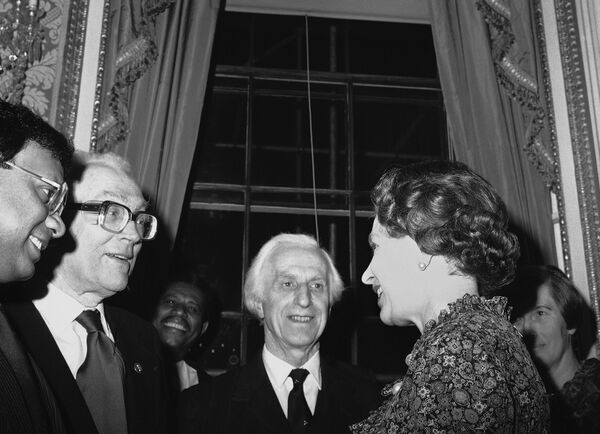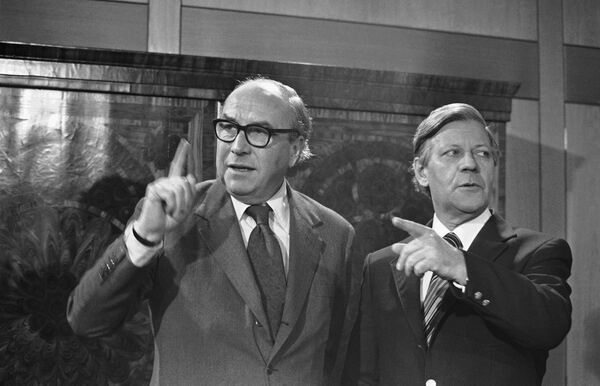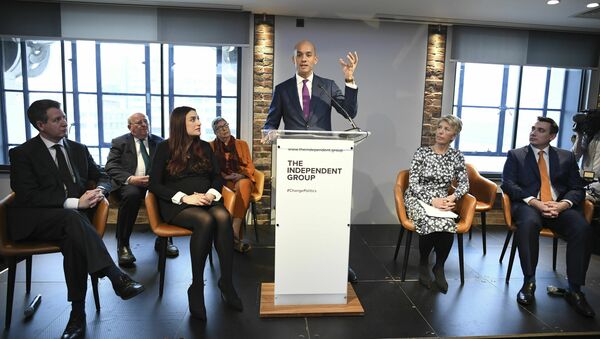The seven "splitters" formed The Independent Group on Monday, 18 February, but refused to step down and face by-elections in their constituencies, despite being elected as Labour MPs in 2017.
The gang of seven claimed they had lost confidence in Labour Party leader Jeremy Corbyn, believed the party had been "hijacked" by the hard-left and was also "institutionally anti-Semitic".
On Tuesday, 19 February, it was reported two Conservative MPs who were dissatisfied with their own leader, Theresa May, for failing to rule out a no-deal Brexit, were considering joining the Independent Group, along with more Labour MPs from the right of the party.
One of the reasons the SDP failed in the 1980s is they attracted only one Conservative MP — Christopher Brocklebank-Fowler. Yet the SDP had several future Tory bigwigs in their ranks — Chris Grayling, Greg Clark & Danny Finkelstein.
— Michael Crick (@MichaelLCrick) 18 February 2019
But haven't we been here before?
In 1981 the Labour Party was drifting to the left under a leader who was often mocked by journalists for his unkempt appearance and terrible fashion sense.
Michael Foot was like Jeremy Corbyn in many ways.
Both were loathed by right-wing newspapers which vilified them and sought to portray them as virtual communists who would ruin the "British way of life".

Both struggled in the polls against a Conservative Party which was widely unpopular.
Margaret Thatcher had swept to power in the 1979 General Election but her monetarist policies soon started to have a damaging effect on British manufacturers and unemployment rose sharply in 1980 and 1981.
Foot was elected leader of the Labour Party in November 1980 and enjoyed a honeymoon period where he was at one point 15 points ahead of the Tories in the polls.
But a handful of MPs on the right-wing of the party, who had supported Denis Healey in the leadership election, saw the way the wind was blowing and decided to form a new centre-left party.

Roy Jenkins — a former European Commission President, David Owen, Bill Rodgers and Shirley Williams were nicknamed the Gang of Four by the press, a reference to Madam Mao (Jiang Qing) and her three allies in the Chinese Communist Party who were put on trial for treason after Mao's death.
On 25 January 1981 the Gang of Four announced the Limehouse Declaration, named after the district of London where they held their first press conference.
"The calamitous outcome of the Labour Party conference demands a new start in British politics. A handful of trade union leaders can now dictate the choice of a future Prime Minister," said the declaration, in its preamble.
History repeating itself: David “Lord” Sainsbury who signed the Limehouse declaration in 1981 and set up the SDP with the breakaway “gang of four” is now rumoured to be one of the backers financing the 2019 “gang of 7” pic.twitter.com/5SfgMxu9z6
— Pilchard the Cat (@reperioverum) 18 February 2019
The new Social Democratic Party (SDP) — closely modelled on Germany's centre-left SPD — was designed to appeal to those who felt Labour's policies were too left-wing.
Over the next two years 28 Labour MPs defected to the SDP and the party was bitterly divided between what had been former friends.
By the time of the 1983 general election Margaret Thatcher had led the country to a glorious victory in the Falklands War and the Conservatives' popularity as a result skyrocketed.
Labour's new manifesto, The New Hope for Britain, supported unilateral nuclear disarmament and several other left-wing positions and was described by Labour MP Gerald Kaufman as "the longest suicide note in history."
Labour was heavily defeated in May 1983 and Foot resigned shortly afterwards.
The SDP and the Liberals — standing together as an alliance- polled 25 percent of the vote, only marginally behind Labour on 28 percent.
"I hope this will be the first stage in what will probably be a substantial remaking of the centre ground of British politics."
— Channel 4 News (@Channel4News) 18 February 2019
Lib Dem leader Sir Vince Cable says the formation of an independent bloc of MPs is potentially "bigger and deeper" than the SDP/Liberal Alliance. pic.twitter.com/R8He95SAJ1
But because of the first-past-the-post system Labour won far more seats than the SDP or the Liberals and only a handful of SDP MPs retained their seats — John Cartwright in Woolwich (he eventually lost the seat to Labour in 1992), Ian Wrigglesworth in Stockton (he lost to a Conservative in 1987, with Labour pushed into third position), Bob Maclennan in Caithness and Owen himself in Plymouth.
One of those defeated at the 1983 election was John Horam, who would later complete his political journey to the right when he was elected as Conservative MP for Orpington in 1992, a position he held until he was knighted in 2010.
The SDP soldiered on under David Owen — a former Foreign Secretary — but lost all but one of its seats at the 1987 election and knew the game was up.
Me defeating the SDP traitor Roy Jenkins in my 1st of 6 parliamentary election victories 1987 in Glasgow Hillhead. #LabourSplinter pic.twitter.com/Vq6FlHMyhF
— George Galloway (@georgegalloway) 19 February 2019
It had failed to make a "new start in British politics" and quietly merged with the Liberals, becoming what is now the Liberal Democrat Party (LDP).
Neil Kinnock, and then Tony Blair, gradually dragged the Labour Party back from the left and positioned it clearly in the political centre ground.
In 1997 Labour won a landslide and for the next decade left-wingers like Jeremy Corbyn sat quietly on the backbenches, often criticising the actions of their own front bench, especially when it came to the war in Iraq in 2003.
Corbyn won the leadership in 2015 in a shocking upset which disturbed and dismayed those who had thought Blair had wrestled the party away from "socialism".
at the time of the Limehouse declaration, Michael Foot's Labour where on over 50% in the polls, they doomed us to years of Thatcherism #wato
— George Bernard Shaw (@Melonhead999) 18 February 2019
Social democracy was dead, at least until 18 February when Chuka Umunna and his little tribe made their move.
Umunna said "the established parties are simply not up to the challenge" and promised the Independent Group offered a new choice.
And so it starts all over again.
Will the Gang of Seven fare any better than the Gang of Four? Don't bet on it.




